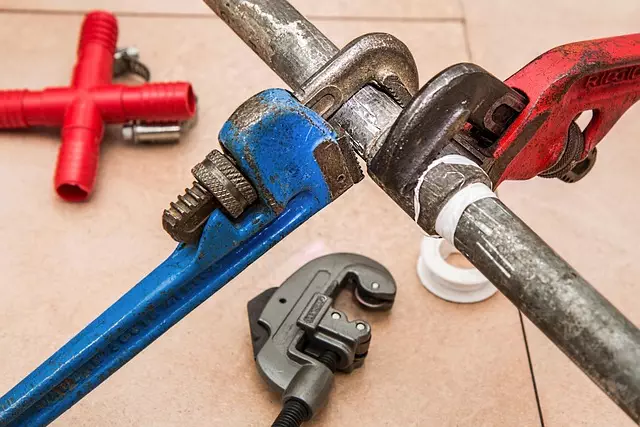Basement water leaks are a leading cause of residential foundation damage, stemming from plumbing issues, improper landscaping, or tiny cracks. Early detection through regular inspections is crucial for preventing structural problems like cracks in walls and floors. Professional Residential Foundation Repair techniques, including moisture meter and thermal imaging assessments, offer effective solutions. Implementing preventative measures like proper drainage and waterproof membranes further protects homes. Choosing experienced professionals ensures reliable and long-lasting repairs for foundation stability.
Basements, often overlooked, can signal serious issues with your home’s foundation. Water leaks and associated foundation problems are common challenges for homeowners, leading to costly repairs if left unaddressed. This article guides you through understanding basement water leaks, their impact on residential foundations, identifying structural damage, and effective repair strategies. Learn about assessment tools, temporary fixes versus comprehensive restoration, and preventative measures to protect your home’s value with expert residential foundation repair solutions.
Understanding Basement Water Leaks: Common Causes and Entry Points

Basement water leaks are a common issue that can lead to serious foundation problems in residential properties. Understanding the causes and entry points is crucial for effective prevention and repair strategies. One of the primary sources of basement leaks is faulty plumbing, including burst pipes or poor drainage systems. These issues often manifest as visible moisture seepage or bubbling in the floor, walls, or ceilings.
Another common cause is improper grading around the home, which can direct rainwater towards the foundation, increasing pressure and potential entry points. Cracks in the foundation walls or floors, even those too small to notice, can serve as pathways for water infiltration. Over time, this can weaken structural elements, leading to further damage. Identifying these problems early through regular inspection is key to mitigating risks associated with residential foundation repair.
The Impact of Moisture on Residential Foundations

Moisture intrusion, especially from basement water leaks, can have severe consequences for residential foundations. Over time, continuous exposure to water and high humidity levels accelerates the degradation process of concrete and other building materials used in foundation construction. This deterioration weakens structural integrity, leading to cracks in walls, floors, and ceilings. These cracks not only compromise the aesthetics of a home but also signal more serious underlying issues that require immediate attention from professionals specializing in residential foundation repair.
The impact of moisture extends beyond structural damage; it can also foster mold growth and mildew formation, which pose significant health risks to occupants. Mold spores, when inhaled, can trigger allergies, respiratory problems, and other adverse health effects. Therefore, prompt identification and resolution of basement water leaks are essential not only for maintaining the financial value of a home but also for ensuring the well-being of its residents. Effective waterproofing solutions and residential foundation repair techniques can mitigate these issues and safeguard the longevity of a property.
Identifying Foundation Issues: Cracks, Settling, and Bowing

Identifying foundation issues is a crucial step in addressing basement water leaks and ensuring the longevity of your home’s structure. One of the most common indicators is cracks in the foundation walls. These cracks can range from hairline fractures to larger, more noticeable gaps. While some cracks may be purely cosmetic, others can signal more severe problems, such as settling or bowing. Settling occurs when the soil beneath your home compresses unevenly, causing the foundation to sink slightly. This often results in small cracks and uneven floors.
Bowing, on the other hand, refers to the bending or curving of foundation walls. It’s typically caused by excessive soil pressure pushing against the exterior of the foundation. Bowing can lead to more significant structural damage and should be addressed promptly by a professional residential foundation repair service to prevent further complications.
Assessment and Diagnosis: Tools for Detecting Leaks and Damage

When it comes to assessing basement water leaks and foundation issues, professionals employ a range of tools designed to detect problems accurately. One common method is moisture meters, which measure the humidity levels in walls, floors, and other surfaces. These devices help identify areas where water intrusion has occurred or is likely to happen, guiding repairs effectively.
Additionally, thermal imaging cameras are used to visualize temperature variations in structures. By detecting heat differences, these tools can pinpoint leaks or structural damage that may be hidden from plain sight. This non-invasive approach ensures safety and provides clear images of the issues, making it easier for homeowners and residential foundation repair experts to collaborate on solutions, ultimately ensuring effective and lasting repairs.
Repair Options: From Temporary Solutions to Comprehensive Restoration

When it comes to basement water leaks and foundation issues, repair options range from temporary solutions to comprehensive restoration strategies. For homeowners, the first step often involves identifying the source of the leak—whether it’s a cracked foundation, faulty plumbing, or poor drainage around the property. Temporary fixes like placing buckets under leaking areas or using pump systems can offer immediate relief but merely address the symptom, not the root cause.
Comprehensive restoration, on the other hand, requires professional intervention in the form of Residential Foundation Repair. This involves assessing and addressing structural damage, re-leveling uneven foundations, and implementing long-term solutions like interior drainage systems, exterior waterproofing, or even foundation replacement if necessary. Investing in these comprehensive repairs ensures not only the immediate cessation of water intrusion but also the protection of the basement and entire home for years to come.
Preventative Measures: Strengthening Your Home Against Water Intrusion

To prevent basement water leaks and foundation issues, homeowners should consider implementing robust preventative measures. One crucial step is to ensure proper drainage around your home, directing rainwater away from the foundation. This can be achieved by installing adequate downspout extenders and creating a slight slope in your yard’s grade to facilitate water flow. Additionally, applying a high-quality waterproof membrane during construction or repairing/replacing existing seals and membranes can create an effective barrier against moisture intrusion.
Regular inspection is another vital preventative measure. Keep an eye out for any signs of water damage, cracks in the foundation, or unusual moisture buildup. Addressing these issues early can prevent further complications and costly residential foundation repair. Consider hiring a professional to conduct periodic assessments, especially if your home is older or situated in an area prone to flooding or high water tables. By taking proactive steps, homeowners can significantly strengthen their homes against water intrusion, safeguarding both the structure’s integrity and the peace of mind of its occupants.
Choosing the Right Residential Foundation Repair Professionals

When facing basement water leaks and foundation issues, choosing the right residential foundation repair professionals is paramount. It’s crucial to opt for experts with a proven track record and specialized knowledge in addressing such problems. Look for companies that offer comprehensive solutions, from identifying the root cause to implementing effective repairs, ensuring long-term stability for your home.
Consider their experience, certifications, and customer reviews to gauge their reliability and expertise. Reputable professionals will provide detailed assessments, explain the repair process transparently, and offer tailored solutions that align with your budget and specific needs. This approach not only guarantees high-quality work but also safeguards your investment in your home’s structural integrity.
